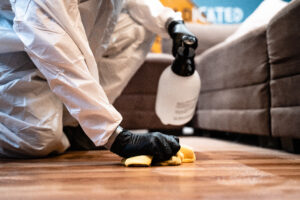
National Physician Suicide Awareness Day: A Call to Action for Mental Health in Healthcare
September 20, 2024How To Clean Up After A Suicide
October 2, 2024The aftermath of a suicide is a devastating and overwhelming experience for those left behind. Beyond the emotional trauma, there’s an immediate practical concern that many aren’t prepared to face: the cleanup of the affected area. This sensitive task requires careful consideration and professional expertise to ensure safety, legal compliance, and respect for the deceased and their loved ones.
Who Should Clean Up After Suicide?
In the wake of such a tragic event, it’s a common misconception that law enforcement or emergency services will handle the cleanup. However, this responsibility typically falls to the property owner or the deceased’s family. The traumatic nature of the scene, combined with potential health hazards, makes it essential to contact a professional suicide cleanup service. These specialized teams are equipped to handle the complex physical and emotional aspects of the situation, providing a compassionate and thorough approach to restoring the affected area.
Why You Should Not Attempt Cleanup on Your Own
Exposure to Bloodborne Pathogens
Suicide scenes often involve significant biohazardous materials, primarily blood and other bodily fluids. These substances can harbor dangerous pathogens, including hepatitis B, hepatitis C, and HIV. Without proper protective equipment and cleaning protocols, individuals risk exposure to these potentially life-threatening diseases. Professional cleanup teams use specialized protective gear and follow strict safety procedures to minimize these risks.
Other Health Crises Prompted by Trauma Scenes
Beyond bloodborne pathogens, suicide scenes can present other health hazards. Decomposition, in the case of an unattended death, can release harmful bacteria into the environment. Additionally, the use of chemicals or substances in some suicide cases may leave behind toxic residues. Professional cleaners are trained to identify and safely remove these hidden dangers, which may not be apparent to untrained individuals.
The Trauma of Suicide Cleanup
Attempting to clean up after a loved one’s suicide can be an incredibly traumatic experience. The visual and emotional impact of the scene can exacerbate grief and potentially lead to long-lasting psychological effects. Professional cleanup teams offer a buffer, allowing family members to avoid this additional trauma and focus on their emotional recovery.
Legal Implications
Improper cleanup of a suicide scene can have serious legal consequences. Failure to adequately decontaminate the area could lead to health risks for future occupants, potentially resulting in liability issues. Professional cleanup teams are well-versed in relevant regulations set by OSHA, EPA, and state health departments. They ensure all cleaning and disposal procedures meet or exceed these legal requirements, protecting property owners from potential fines and future liability claims.
Steps Involved in Professional Suicide Cleanup
- Initial Contact and Rapid Response: Professional cleanup teams offer 24/7 availability and aim to respond quickly, often within hours of being contacted. This rapid response is crucial to minimize further damage and begin the restoration process as soon as possible.
- Initial Assessment and Preparation: Upon arrival, teams conduct a thorough assessment, identify affected areas, develop a cleanup plan, set up containment measures, and prepare equipment. This careful planning ensures a comprehensive and efficient cleanup process.
- Documentation: Teams photograph and document the scene for insurance purposes and to ensure a thorough cleanup. This step is crucial for insurance claims and provides a clear record of the state of the scene before cleanup begins.
- Cleaning and Sanitizing the Area: This involves removing visible traces of biohazardous materials, affected materials, and using specialized cleaning agents and disinfectants. The team pays special attention to hidden areas where fluids may have seeped, ensuring complete decontamination.
- Deodorization: Teams use specialized techniques to neutralize odors at their source, not just mask them. This step is crucial for restoring the space to a livable condition and preventing lingering reminders of the incident.
- Verification and Restoration: Specialized equipment is used to detect any remaining biological material. The area is then restored to its original state, which may involve minor repairs or coordinating with other professionals for more extensive work.
- Proper Disposal of Biohazardous Waste: All contaminated materials are safely removed and disposed of according to legal regulations. This ensures compliance with health and safety standards and prevents potential environmental hazards.
- Final Walk-through and Client Approval: A final inspection is conducted, often with the client, to ensure complete satisfaction. This step allows for any final adjustments and provides peace of mind to the client that the area has been thoroughly cleaned and restored.
How to Choose a Professional Cleanup Team
Selecting the right suicide cleanup company is crucial for ensuring a safe, thorough, and compassionate process. Reputable companies typically share several key characteristics:
- Specialization in biohazard remediation, particularly trauma and suicide cleanup
- 24/7 availability for rapid response
- Proper licensing, bonding, and insurance
- Comprehensive training for all technicians in cleaning biohazardous situations and safety protocols
- Use of proper personal protective equipment (PPE) and industry-standard cleaning agents
- Discretion and respect for privacy, including the use of unmarked vehicles
- Clear, upfront pricing with no hidden fees
- Experience in working with insurance companies and assistance with claims
- Compassionate approach and resources for emotional support
- Thorough documentation of the cleanup process for insurance or legal purposes
Look for companies that demonstrate extensive experience in suicide cleanup specifically. They should be able to explain their processes clearly and address any concerns you may have. A reputable company will prioritize your well-being and understand the sensitive nature of the situation.
Insurance Coverage for Suicide Cleanup
The question of insurance coverage for suicide cleanup is complex and depends on various factors. While many property or homeowners insurance policies do cover biohazard cleanup, including suicide, it’s essential to verify coverage with your specific provider. Policy terms can vary significantly, and some may have exclusions or limitations for these situations.
Reputable suicide cleanup companies often have experience navigating the insurance process. They can help you understand your coverage, communicate with your insurance provider, and manage the claims process on your behalf. This support can be invaluable during an already stressful time.
If insurance coverage is limited or unavailable, many professional cleanup companies should offer alternative payment options.
These may include:
- Direct billing to insurance companies
- Flexible payment plans
- Assistance in identifying potential financial aid resources
- Transparent, itemized pricing to help you understand costs
When selecting a company, inquire about their payment options and their experience with insurance claims. A company that offers support in this area can significantly reduce the financial stress associated with the cleanup process.
Focus on Healing
Engaging a professional suicide cleanup service allows those affected by the tragedy to focus on their emotional recovery and healing process. By entrusting the cleanup to experts, family members and friends can:
- Avoid additional trauma from handling the cleanup personally
- Dedicate time and energy to grieving and processing their loss
- Attend to important matters such as funeral arrangements and notifying loved ones
- Seek professional emotional support or counseling
- Begin the process of moving forward without the burden of cleanup logistics
Professional cleanup teams understand the emotional weight of their work and often approach their tasks with compassion and respect. Many provide resources for grief counseling or can connect families with local support services. This holistic approach to cleanup not only addresses the physical aftermath but also supports the emotional well-being of those affected.
About Suicide Cleanup
Suicide Cleanup is dedicated to providing compassionate, professional, and thorough cleanup services in the aftermath of suicide incidents. With over two decades of experience in biohazard remediation, our team understands the unique challenges and sensitivities involved in suicide cleanup.
We offer 24/7 emergency response, ensuring rapid assistance when you need it most. Our certified technicians are extensively trained in the latest biohazard cleanup techniques and safety protocols. We prioritize discretion and respect, arriving in unmarked vehicles and maintaining strict confidentiality throughout the process.
At Suicide Cleanup, we go beyond mere cleaning. We offer comprehensive support, including assistance with insurance claims, flexible payment options, and connections to grief counseling resources. Our goal is to shoulder the burden of cleanup, allowing you to focus on healing and recovery.
If you’re facing the difficult task of suicide cleanup, know that you don’t have to handle it alone. Contact Suicide Cleanup at 888-752-5001 for immediate assistance and compassionate support. Our team is here to guide you through this challenging time with professionalism, empathy, and expertise.



